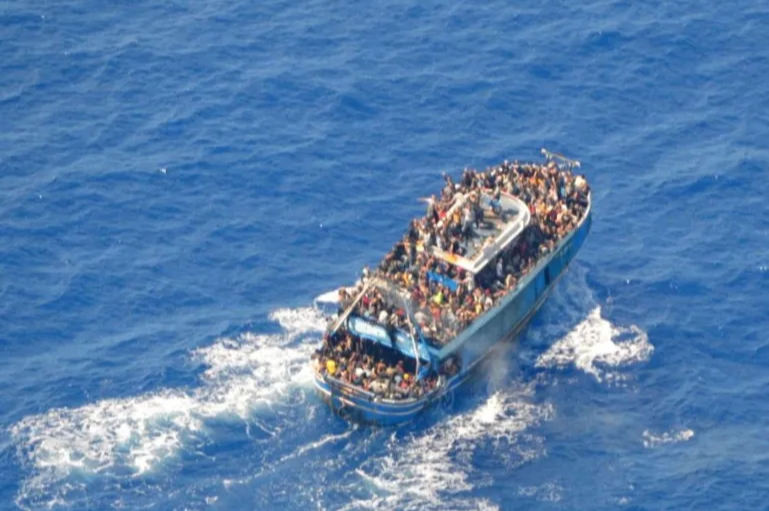
People on board a boat during a rescue operation, before it capsized in the open sea off Greece [File: Hellenic Coast Guard/Handout via Reuters] Weeks after the shipwreck off Greece in which hundreds of people died, bloc steps up efforts to investigate disaster.
Brussels, July 27 (RHC)-- The European Union watchdog has announced a probe into the bloc’s border patrol agency, Frontex, over its actions during a deadly shipwreck off Greece.
The investigation is “aimed at clarifying Frontex’s role in search and rescue operations in the Mediterranean sea following the drowning of hundreds of people off the coast of Greece on 14 June”, Ombudsman Emily O’Reilly said in a statement on Wednesday.
The independent probe by the European Ombudsman, which looks into suspected cases of poor administration by EU bodies, was launched on O’Reilly’s initiative. It adds to two investigations Greece says it has started: a criminal one into alleged smugglers it blames for the tragedy, and another into the actions of its coastguard.
The boat that sank, an overcrowded fishing trawler, was carrying up to 750 people picked up in Libya who sought to cross the Mediterranean to irregularly enter Europe.
About 100 of them were saved, but it is thought that some 600 drowned, according to Greek figures relayed by EU Commissioner Ylva Johansson to the European Parliament in early July.
EU politicians in that hearing expressed scepticism that the Greek probes into the sinking would be adequately carried out. They called for an independent and transparent investigation and O’Reilly said her office’s investigation would be carried out in coordination with the Greek Ombudsman Andreas Pottakis.
Athens has already rejected survivors’ accounts that the Greek coastguard tied a rope to the drifting vessel and then powered off, causing it to capsize. It will request a “wide range” of Frontex documents on the sinking, including an internal serious incident report, as well as those related to other incidents in the Mediterranean.
“A tragedy of this magnitude requires all those involved to reflect on their responsibilities and to be clear to the public who is accountable for these deaths,” said O’Reilly.
One aspect of the investigation will focus on rules about the use of cameras on boats during joint operations. That could yield information as to why state-of-the-art cameras on a Greek coastguard vessel near the boat were switched off at the time of its sinking.
The probe would also examine how Frontex and national authorities in EU member states share search and rescue information, and what role they give to ships run by charities that carry out rescue operations.
The investigation will also weigh how the EU lives up to its commitments on maintaining fundamental rights when it comes to migration “and does not lose sight of the human suffering that compels people to seek a better life beyond their home countries”, she added.
Frontex chief Hans Leijtens, who appeared in the same July 6 European Parliament hearing as Johansson, said that on the night of the sinking, “we offered to help, but there was no response from Greek authorities”.

